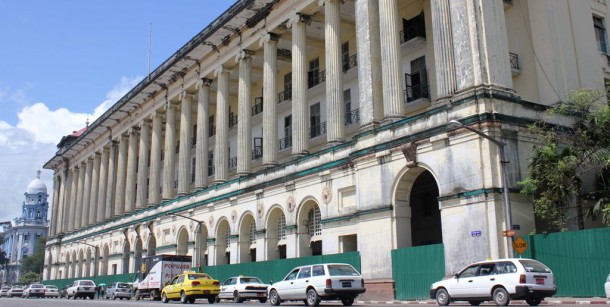RANGOON — A Rangoon-based legal network announced that it will sue the city’s chief minister over the privatization of a landmark colonial-era building owned by the government.
The Lawyers Network, an independent legal advisory body, said that the Divisional Court building, which is commonly known as the Police Commissioner’s Office after its original function, had been unlawfully leased to private companies to develop a luxury hotel.
Network representatives said that sometime in November they intended to sue Chief Minister Myint Swe—who also chairs the Myanmar Investment Commission—and “all related parties” for involvement in what they said was a shady property deal.
“We first opposed privatizing this building in 2012, and since then the development had been slow. On Oct. 7, however, I saw news on TV that Yangon [Rangoon] Chief Minister Myint Swe signed a MoU with the Premier Residence Company to repair the building and turn it into a hotel,” said Kyee Myint, a member of the Lawyers Network.
“We don’t know what the minister’s relationship is with this company,” he added.
The 90-year-old Police Commissioner’s Office occupies an entire city block in the heart of downtown Rangoon’s colonial district, and until a few years ago it still served a public function as chamber offices for Rangoon Division’s court officials.
The office was shuttered in 2012 and a Burmese company, Flying Tiger, was reportedly granted a 60-year lease to develop the property into a hotel. All of the courts and offices housed in the building were relocated to their relevant townships, and Flying Tiger began some renovations.
In early 2013, the company told local media that they would invest US$50 million in the project, which would be called the State House Hotel. Annual rent had been set at 7 percent of total revenue plus a one-time $14.4 million land use fee, the company said.
The Lawyers Network had made several appeals to the government, asking them to renovate the building with public funds and maintain its public function instead of leasing it to private developers.
Kyee Myint also said that transferring all of the judicial offices to areas further afield caused administrative and logistical difficulties for court officials and a transportation nightmare for lawyers.
“When all of the offices were in the same building it was easy to access everything we needed,” he said. Under the new arrangement, attorneys waste time and money trying to hit all of the offices relevant to their cases. “This building was intended for legal affairs. That’s why we don’t want it to become a hotel.”
Kyee Myint and fellow Lawyers Network members Than Tin and Ohn Maung shared further concerns about the site’s new developer, Premier Housing. They said that news of a different developer came as a shock to them, as the deal had already been granted to Flying Tiger two years ago.
“I’d like to know how the managing company’s name suddenly changed from Flying Tiger to Premier Residence,” Kyee Myint said. “It’s dishonest. There have been no reports of this project changing ownership. Anyway, we’re going to sue all related parties.”
Attempts to contact the Myanmar Investment Commission were unsuccessful.

















